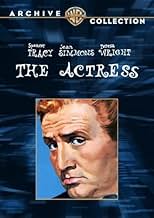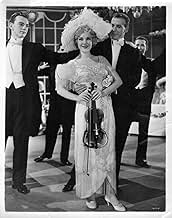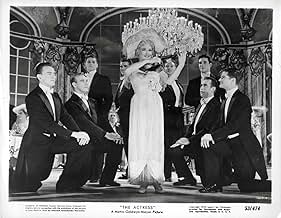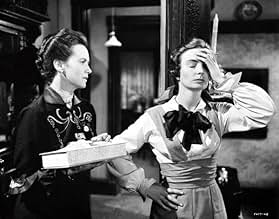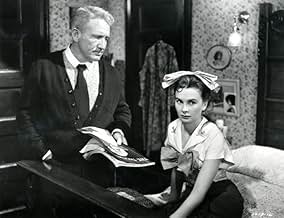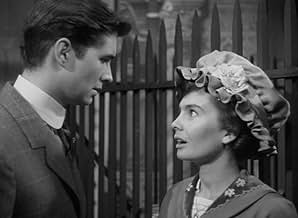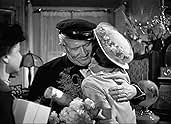The Actress
- 1953
- Tous publics
- 1h 30min
NOTE IMDb
6,4/10
1,6 k
MA NOTE
Ajouter une intrigue dans votre langueThis is an account of the real life experience of actress/playwright Ruth Gordon.This is an account of the real life experience of actress/playwright Ruth Gordon.This is an account of the real life experience of actress/playwright Ruth Gordon.
- Nommé pour 1 Oscar
- 2 victoires et 3 nominations au total
Erville Alderson
- Mike McGrath
- (non crédité)
Hal Bell
- Chorus Boy in 'The Pink Lady'
- (non crédité)
Jackie Coogan
- Inopportune
- (non crédité)
Ken DuMain
- Spectator at Show
- (non crédité)
James Elsegood
- Chorus Boy in 'The Pink Lady'
- (non crédité)
Adolph Faylauer
- Spectator at Show
- (non crédité)
Raoul Freeman
- Spectator at Show
- (non crédité)
Robert Fuller
- Dancer
- (non crédité)
Ed Fury
- Dance Partner
- (non crédité)
Avis à la une
"The Actress" released in 1953 by MGM, is a story apparently based on the life of actress Ruth Gordon. Here, a young Jean Simmons plays Ruth, "the actress." Simmons performance runs the gamut of happiness, sadness, and hopefulness -- in other words, just like many young people are. Simmons is obsessed with being an actress and will do anything for her dream. The story makes us ask ourselves: how many of us would sacrifice the life we know to pursue a dream? Anyway, the story is set in early 20th century New England, with Spencer Tracy playing Simmons father and Teresa Wright playing her mother. Tracy plays a stubborn and somewhat cantankerous role, a man hardened by life, and it just may be one of Tracy's finest performances. Wright plays the supportive mother to Simmons, although in reality Wright was only in her 30's here -- a good actress pushed prematurely into matronly roles. Both Ruth and her mother are afraid to tell Tracy about her acting ambitions, thinking he will hit the roof. Surprisingly, he does not, but he thinks she is not ready to be an actress and wants her to finish her education. One gets the impression that he had his own dreams, cut prematurely by reality -- marriage, children, and a working-class existence. The script is somewhat mundane and drags a bit at times, but the three principle actors are the real reason to watch this film. They do not disappoint. Also look for a young Anthony Perkins playing Simmons awkward boyfriend. This is not a big film, and it has some flaws, but still very much worthwhile.
I've liked many of George Cukor's films (PHILADELPHIA STORY, WHAT PRICE HOLLYWOOD, etc.) and am a huge Spencer Tracy fan so I was surprised I had never seen this 1953 flick. Based on Ruth Gordon's biographical play, this is a sweet, endearing film and it holds one of Spencer Tracy's best performances. He is so real, so good as the overwhelmed father - trying to deal with a turn of the century daughter who wants to be an actress (back then that was like saying you wanted to be a prostitute - theatre people were very looked down upon). Tracy (based on Ruth Gordon's real father) has wonderful scenes/speeches where he tries to lay down the law but later on, you see how much he loves his daughter and would do anything for her. Teresa Wright is good as always and the lovely Jean Simmons is superb as the young girl who has become star struck. Plus a very young Anthony Perkins making his screen debut as a possible suitor. Highly recommended
This movie is so much more than a sentimental reminiscence. I'm not much at all for those "I remember..." mom or dad or whatever memory movies. Also, there are so many, many plays and movies about a family's career aspirations for a son, aspirations that get challenged because of what the son wants to do instead. Here we have a story set after the turn of the 20th century, about a working class father's career aspirations for his DAUGHTER - a career that will provide her with financial stability but isn't at all what she wants to do. Spencer Tracy plays a curmudgeon, working-class, not-at-all refined father in a role I've never seen him in before - and he's AMAZING. The dialogue has some one linters that are, at times, hysterical - any person who has every been embarrassed by their parents, or every had a parent say something like, "Why did you ever have to be so different?" will warm to this movie immediately. And the Mary Wickes moment is why she makes every movie better even if she's in it for less than 20 seconds.
Ruth Gordon's play Years Ago, a sentimental reminiscence along the lines of Kathryn Forbes' Mama's Bank Account, looked at her stage-struck adolescence. In 1953, it became a movie, The Actress, directed by George Cukor, with the rarefied and mannered Jean Simmons taking the part of the straight-shooting Gordon. Oddly enough, the main character is not the aspiring actress but her father, played by Spencer Tracy.
In Clinton Jones, Gordon penned a difficult but irresistible character. Settled unarguably into middle age but still fighting it, he chafes at his $37.50-a-week salary (it was 1913) and pores over the grocery list while his wife (Teresa Wright) defends such frivolities as tangerines. A former sea captain, he latches onto any opportune ears like the Ancient Mariner and spins his salty yarns of ports of call on the seven seas. In the dead of a New England winter, he insists on sleeping in a hammock strung on an upstairs porch. The ham in Tracy rises to the challenge, and he manages to make Jones recklessly funny while still a bit frightening (near the end, details of his dreadful boyhood emerge to put his cantankerousness in focus).
As screenwriters, Gordon and her husband Garson Kanin custom-tailored many screen vehicles for Tracy and co-star Katharine Hepburn, where their relationship is said to take the writers' marriage as its model; here Tracy returns the favor by making Gordon's father so unforgettable. Gordon pays a tribute, too, by sketching her character not as she remembered it but as he must have seen her, showing little talent or wit but a penchant for dreaming up castles in Spain. By hiding her own bright light under a bushel, she lets the memory of her father shine.
In Clinton Jones, Gordon penned a difficult but irresistible character. Settled unarguably into middle age but still fighting it, he chafes at his $37.50-a-week salary (it was 1913) and pores over the grocery list while his wife (Teresa Wright) defends such frivolities as tangerines. A former sea captain, he latches onto any opportune ears like the Ancient Mariner and spins his salty yarns of ports of call on the seven seas. In the dead of a New England winter, he insists on sleeping in a hammock strung on an upstairs porch. The ham in Tracy rises to the challenge, and he manages to make Jones recklessly funny while still a bit frightening (near the end, details of his dreadful boyhood emerge to put his cantankerousness in focus).
As screenwriters, Gordon and her husband Garson Kanin custom-tailored many screen vehicles for Tracy and co-star Katharine Hepburn, where their relationship is said to take the writers' marriage as its model; here Tracy returns the favor by making Gordon's father so unforgettable. Gordon pays a tribute, too, by sketching her character not as she remembered it but as he must have seen her, showing little talent or wit but a penchant for dreaming up castles in Spain. By hiding her own bright light under a bushel, she lets the memory of her father shine.
This is a wonderful movie about the life of young Ruth Gordon, who would grow up to be an actress and famous writer. She was married to Garson Kanin and wrote many of the films of Tracy and Hepburn. Tracy is wonderful in one of his "dad" roles, as are the other leads in the film. Debbie Reynolds was originally to play Ruth but Simmons was cast instead and she is indeed brilliant in the movie. She is touching and very funny, very much a young girl driving her parents crazy. Tony Perkins is also very good as her boyfriend. Best of all, and not mentioned in most of the other reviews here, is Teresa Wright as the mother. She is a riot in the part and was only 11 years older than Simmons in real life. She had taken a reduction in pay for another great film, The Men, and this was one of her other really good parts in the fifties after so many great parts in the forties. The part is sort of like her last one, in The Rainmaker, as a simple kind of person. She played them wonderfully and was very funny in both.
Le saviez-vous
- AnecdotesFilm debut of Anthony Perkins.
- GaffesIn a scene late in the film, set in the kitchen, the light fixture over the kitchen table is seen (and heard!) to rise up to allow the camera to pass below it.
- Citations
Annie Jones: Ruth, why don't you give up this going on the stage business and settle down with a nice man?
Ruth Gordon Jones: Oh, mama, don't be disgusting!
- Crédits fousOpening credits are shown over the cover of a photo album, and the film begins by showing us various photos from inside the album.
- ConnexionsFeatured in The Men Who Made the Movies: George Cukor (1973)
- Bandes originalesSilent Night, Holy Night
(1818) (uncredited)
Music by Franz Xaver Gruber
In the score for photo album pictures
Meilleurs choix
Connectez-vous pour évaluer et suivre la liste de favoris afin de recevoir des recommandations personnalisées
- How long is The Actress?Alimenté par Alexa
Détails
Box-office
- Budget
- 1 424 000 $US (estimé)
- Durée1 heure 30 minutes
- Couleur
- Rapport de forme
- 1.37 : 1
Contribuer à cette page
Suggérer une modification ou ajouter du contenu manquant

Lacune principale
By what name was The Actress (1953) officially released in India in English?
Répondre


